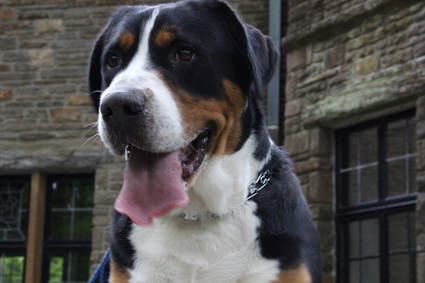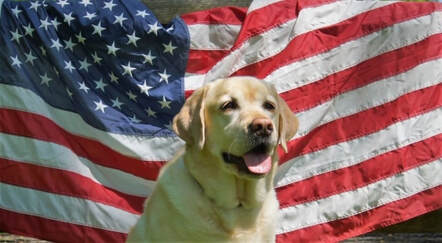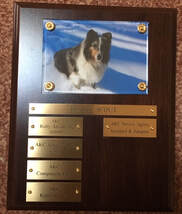|
What is a Special Needs Class?
(Bonus - TV show) I graduated from Basic Skills.
What's Next? After graduation from basic skills, You are ready to join our member training program. You and your dog have learned many new skills, but now, practice is needed to make them permanent and reliable. Your membership is for the human in the team. If you have a multiple dog family any dog that knows how to behave and not disrupt the class is welcome... or you can take the second dog through Basic skills for just the cost of the class (see member page for that price). You are automatically signed up. Just show up on a Thursday night. Check your newsletter for the schedule. Once a month (2nd Thursday) we have a match. Think of it as a quiz. Use it to make your dog more reliable. While some members are serious trainers with goals of earning titles and showing their dogs, Many just want a pet that they can rely on. Whichever you are, there is a place for you. Why do we train our dogs to heel on our LEFT?
When you join/sign up it is in one person's name! That person is the trainer and member.Two dogs one trainer? You pay member prices for the second dog and sign up for a DIFFERENT class. Basic skills would be $115 first member with dog and $50 for 2nd dog with the same trainer/member. You also have the option of training the second dog on Thursdays. Two dogs two trainers? Two full memberships. (Basic skills would be $115 each member) show what you have learned. And in the process you earn titles. In obedience you can earn a Companion Dog (CD), Companion Dog Excellent (CDX) or Utility Dog (UD) titles plus more. And you can go on from there to Masters and champion levels. And there are similar titles in Rally.
Obedience and Rally are known as companion sports, but there is more. There are performance sports too. Some, like tracking, are open to all breeds and some, like herding are limited. While the Berks County Dog Training Club doesn’t offer training in all the sports, our obedience gives you the foundation to move into many areas. BCDTC Awards banquet recognizes your efforts in many training areas. It is attended by people who have worked hard and earned titles during the previous year and by their friends, families and fellow trainers. Consider joining us this February for our annual event. And if your dog earned something, let us know and be included in the festivities. Earning your plaque at no charge
|
"Housebreaking Issues"
TRAINING HINTS:What is a lure, a bribe & a reward?By Linda Gantert, BCDTC member
What is a Lure?? A lure — food or a toy — is presented BEFORE a desired behavior specifically to entice the dog to perform the required response voluntarily and on cue. When luring dogs, it is taken for granted that the dog would gladly do what we want if only he knew what we wanted him to do. Luring specifically teaches the dog what response is required for each command. Luring teaches the meaning of the commands. Without the use of lures, the dog may be perfectly willing & eager to please but has no idea what we want him to do, like asking a novice dog to sit for example. In fact, the dog may have no idea that we want him to do anything at all. What is a Reward? Rewards are given to the dog AFTER the desired response to reinforce the immediately preceding appropriate behavior so it is more likely to occur again in the future. The dog’s favorite treat, toys, games, activities & of course, affection may all be used effectively. Additionally, praise is a great reward since it can be used at almost any time & in any scenario; like the dog is some distance away. What is a Bribe? A bribe, again food or a toy, is offered or promised before a required behavior in an attempt to coerce the dog to perform the specific command. But some dogs may accept the bribe but then still refuse to do what the trainer wants. Other dogs may comply if a bribe is in the offering but otherwise refuse. Not only is bribery ineffective but it may create training problems. Bribe-contingent reliability is the most common problem created not only by dog trainers but parents & politicians as well. "What is your dog learning"
Does your dog jump on you and your guests? Keep in mind, dogs do what pays off. So somehow, jumping up is paying off for your dog. Is he getting attention for jumping up? Is he not getting attention when he isn't jumping up? Often pet owners think scolding a dog for jumping up should teach them not to jump when, in reality, the dog wants that owner eye contact and direct interaction. Think through what your dog is getting out of this unwanted behavior and how you might give him what he wants for not jumping. Housebreaking issues?Two things to think about; 1. Have you cleaned up well from the last accident? if you leave scent behind, dogs are likely to repeat (make sure there is no ammonia in your product). 2. Are you consistent in your timing. Both feeding and walking. Free Feeding (bowl of food down, eat when you feel like it) leads to needing to potty whenever. There is a direct link between eating and potty time. Control one you should have control of the other. A thought: Don't have time for an extra walk? Clean-up takes longer! Other articles of interestDog resists grooming and growls
Car Travel and your dog
|
Site created and maintained by Lynnmillarart www.Lynnmillarart.com contact


